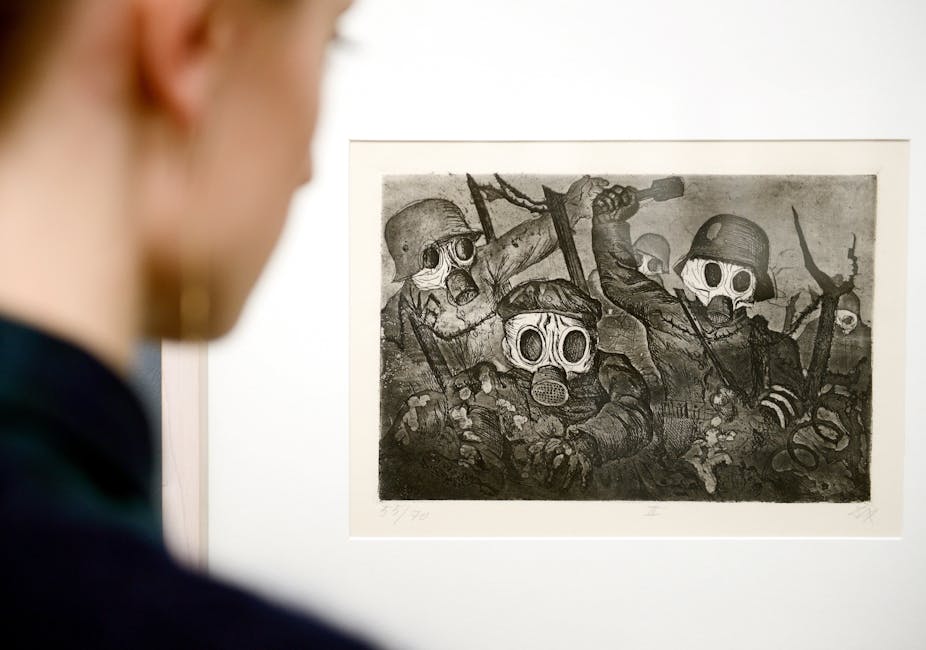German approaches to the history lessons of World War I are characterised by a sense of distance and an anti-war attitude. But probably the most striking feature of the way Germany teaches its children about World War I in this centenary year is the sideways connection being made across Europe.
Being a German working on British culture in the UK has made the differing war memories of each country quite tangible for me. I tend to insist on a connection between past and present, but one that clearly separates the two. Britain’s unbroken identification with a country at war feels strange, as does the casual use of words such as “enemy” or “home front”.
In Germany, the Holocaust and World War II continue to dominate cultural memory, including the teaching of history. Battlefield tourism is rarely on the agenda, but German pupils travel to concentration camps as a matter of course.
Yet the traumatic legacy of the Third Reich is not the only concern. When Sylvia Löhrmann, president of the standing conference of ministers of education and cultural affairs, declared 2014 an important year of remembrance for German schools, she placed the centenary of World War I alongside the 75th anniversary of World War II and the fall of the Berlin Wall 25 years ago.
Absence of material
Such spread of attention might be the reason why commentators felt Germany had a slow start into the 1914 centenary. But even the most dedicated followers of the centenary face a challenge. They cannot tap into a popular cultural archive.
Wartime and inter-war German literature and films are less known than their anglophone counterparts. Nazi attempts to rewrite the history of World War I, such as in the 1938 feature film Pour le Mérite, are undesirable propaganda. Later productions on World War I are so few and far between that they hardly matter at all.
This accounts for a clear boundary between literary accounts and historical writing in Germany. It is different from Britain, where writers and historians often present World War I side by side. A recent event on “how schools should best prepare” for the centenary, organised by the public school Wellington College, serves as an example of this British approach.
In the German context, the historical archive also comes under scrutiny. The exploration of past lives and views is usually one of comparison and critical reflection on one’s own situation and values. This strategy is part and parcel of the citizenship focus of German history teaching. It is a way for learners to interact with the questions of guilt that could be raised by the material they study.
Euro-centric place in history
The focus on comparison and relations with neighbours shows how necessary it is to react to a negative historical image. More constructively, it confirms the reinvention of Germany as a European player and facilitator. Remembering war is firmly rooted in this understanding.
The Volksbund Deutsche Kriegsgräberfürsorge, the charity looking after German war graves, is dedicated to a European culture of remembrance and runs an international educational programme. The Rhineland calls its World War I project on this contested region 1914 - In the Middle of Europe.
The centenary has triggered school exchanges between Germany and Bosnia-Herzegovina. The teacher conference 1914-1918: War and Peace, held in Hannover in February 2014, showcases French-German conversations and advocates a transnational teaching of history. The State Library of Berlin coordinates the Europeana Collections 1914-1918, stressing the importance of World War I for a common European identity.
An event promising an interactive exposure to history is being organised in May 2014 by the Federal Agency for Civic Education. Advertised in German and English, Look back, think forward: Be a part of Europe 14|14! promotes Europe as a joint peace project. It also markets Berlin as a youth destination and site of (popular) history, turning Germany’s awkward historical position into an advantage – all under the European banner, of course.
Is Germany’s European take on the centenary useful and inclusive? Or is it self-serving and patronising, simply a feature of what Wolfgang Schivelbusch described as a culture of defeat? I would argue that any strategy comes at a price, and not all outcomes of the centenary years can be foreseen.
Both approaches have value
The UK’s emotional recovery of the war years through re-enactment, song and even trench-building is for me more nostalgically marked than for those who engage in it. It is also the basis for considerable cultural productivity at a local level. I have seen how World War I heritage funding has empowered British schools and community groups, local historians and creative practitioners.
Local and family history, at least publicly displayed, has had limited appeal in Germany due to the dread of what one might find. But, as the large turn out at Berlin’s Europeana collection days has shown, many items have survived in German households. They are now shared in a liberating, pan-European “show and tell”, initially inspired by the Oxford-led Great War Archive.
The German model of remembrance also has potential. It could expand knowledge about German colonialism and the long history of German-Turkish relations. Whether the Europe 14|14 event will be followed by Turkey 15|15, with an eye on the Dardanelles and the Armenian genocide, remains to be seen.
Much depends on how Turkey constructs its World War I memory. Nevertheless, German and German-Turkish teachers, pupils and citizens might be interested in discovering their World War I heritage together on a local level.

